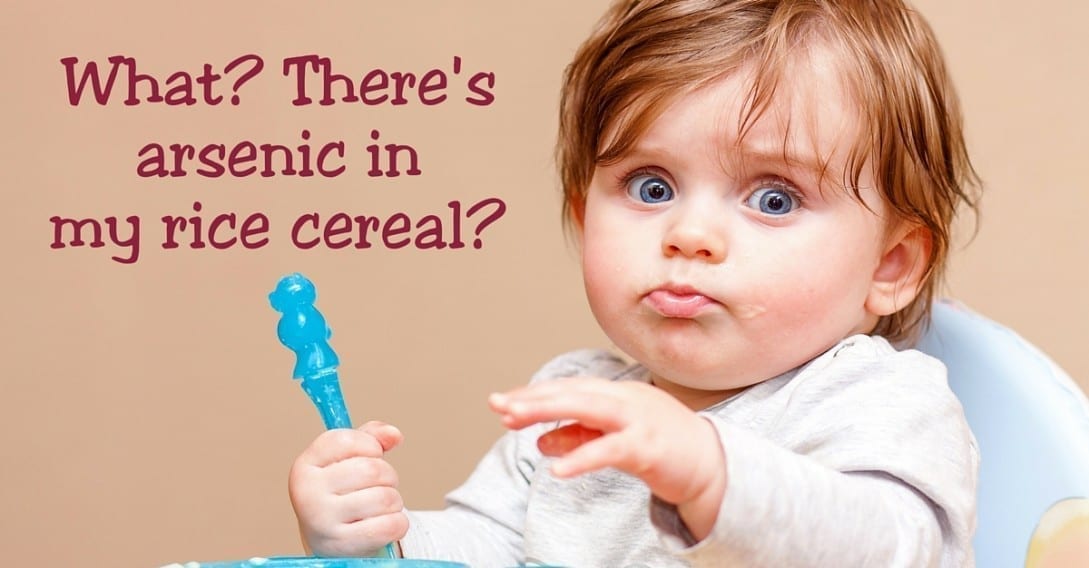Anyone who has or had a young child knows that infant rice cereal is one of the most common first foods out there. Not only is it a simple way to incorporate fruits and vegetables into a child’s diet early on, but the cereal itself is easy to digest and typically safe for kids prone to food allergies. Also, it’s full of vital vitamins and nutrients to help a baby’s body and brain grow, or so we thought. Unfortunately, a study was recently conducted that discovered that infant rice cereal actually contains high levels of arsenic, and “ little has been done to reduce the amount of arsenic found in” the popular cereal.
Anyone who has or had a young child knows that infant rice cereal is one of the most common first foods out there. Not only is it a simple way to incorporate fruits and vegetables into a child’s diet early on, but the cereal itself is easy to digest and typically safe for kids prone to food allergies. Also, it’s full of vital vitamins and nutrients to help a baby’s body and brain grow, or so we thought. Unfortunately, a study was recently conducted that discovered that infant rice cereal actually contains high levels of arsenic, and “ little has been done to reduce the amount of arsenic found in” the popular cereal.
The study itself was “conducted by an alliance of scientists, non-profits and donors called Healthy Babies Bright Futures (HBBF),” and their findings actually determined that many brands of rice cereal have “six times more arsenic than cereals made other grains, such as barley, corn or wheat.”
So what kind of brands should parents and caregivers be on the lookout for? Well, while there are many brands out there on store shelves, the study concluded that the following have the highest arsenic content: Beech-Nut, Gerber, BioKinetics, Earth’s Best, Nestle and Little Duck Organics.

But why does rice cereal seem to have more arsenic than other types of cereal? For starters, “rice absorbs 10 times more arsenic from soil and water than other grains do, and as a result, rice cereals contain an average arsenic level of 85 parts per billion,” according to the study. That sounds like a high number, but it’s actually less than the 103 parts per billion that was found in various rice cereals back in 2014. Even though the number appears to be decreasing as more businesses take efforts to decrease levels of arsenic in their own brands of rice cereal, the HBBF “believes that more needs to be done to reduce arsenic levels.” After all, the “EPA’s arsenic standard for drinking water is 10 parts per billion.”
When discussing how the government should respond to reports of high arsenic levels in baby cereal, the study stated:
“Widespread concern and public pressure – combined with growing science on arsenic’s toxicity at low doses – should have spurred the U.S. Food and Drug Administration (FDA) and the cereal industry to take high-arsenic cereals off store shelves. It hasn’t happened…[The] FDA is, in a word, stalled. More than a year after issuing its 2016 draft guidance to cereal makers – the culmination of four years of assessment – FDA is falling short of protecting infants. It has not set a final limit for arsenic in rice cereal…Arsenic is strictly regulated in drinking water, but is legal in any amount in infant rice cereal. It is a potent human carcinogen and a neurotoxin shown to permanently reduce children’s IQ.”
Despite the study’s call to action for something to be done about the cereal, some brands mentioned in the study have pushed back against the findings and accusations that their products are unsafe. For example, a Gerber spokesperson issued a statement saying “their rice cereals are safe to eat.” The company also said:
“We want to reassure parents that Gerber rice cereals are safe. Every ingredient we use in our baby foods—rice included—must meet our rigorous standards, which align with the best available government guidance. We also have our own standards for safety and quality that go beyond government requirements.”
Sources:
Arsenic in baby food: Study finds high levels in popular name-brand cereals


Join the conversation!